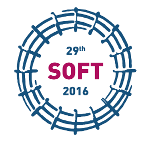Speaker
Seongcheol Kim
(Department of Nuclear Engineering)
Description
Mitigation of heat and particle fluxes reaching on divertor plates is still a critical problem even though innovative divertor concept such as super-X and snowflake divertors have been suggested. A new divertor concept for the reduction of heat and particle fluxes is to convert thermal energy to electrical energy by separating electrons from the plasma with appropriate magnetic field. Feasibility study of charge separation has been conducted successfully in curved magnetic field [K.S. Chung et al., FED 2015]. However, this study has not been implemented in tokamak environment. In order to study feasibility of the charge separation in the VEST (Versatile Experiment Spherical Torus) device, a new scenario with two X-points is developed by using two partial solenoid (PF2) coils near the central solenoid (PF1). The location and geometry of divertor plates appropriate for studying a heat mitigation method based on charge separation are also considered. The details of diverted plasma scenario and future plan for the divertor heat mitigation experiments are presented in this paper.
Co-authors
Jeonghun Yang
(Department of Nuclear Engineering, Seoul National University, Seoul, South Korea)
Jeongwon Lee
(Department of Nuclear Engineering, Seoul National University, Seoul, South Korea)
K. S. Chung
(Department of Nuclear Engineering, Seoul National University, Seoul, South Korea)
Kyoung-Jae Chung
(Department of Nuclear Engineering, Seoul National University, Seoul, South Korea)
Seongcheol Kim
(Department of Nuclear Engineering, Seoul National University, Seoul, South Korea)
Y. S. Hwang
(Department of Nuclear Engineering, Seoul National University, Seoul, South Korea)

